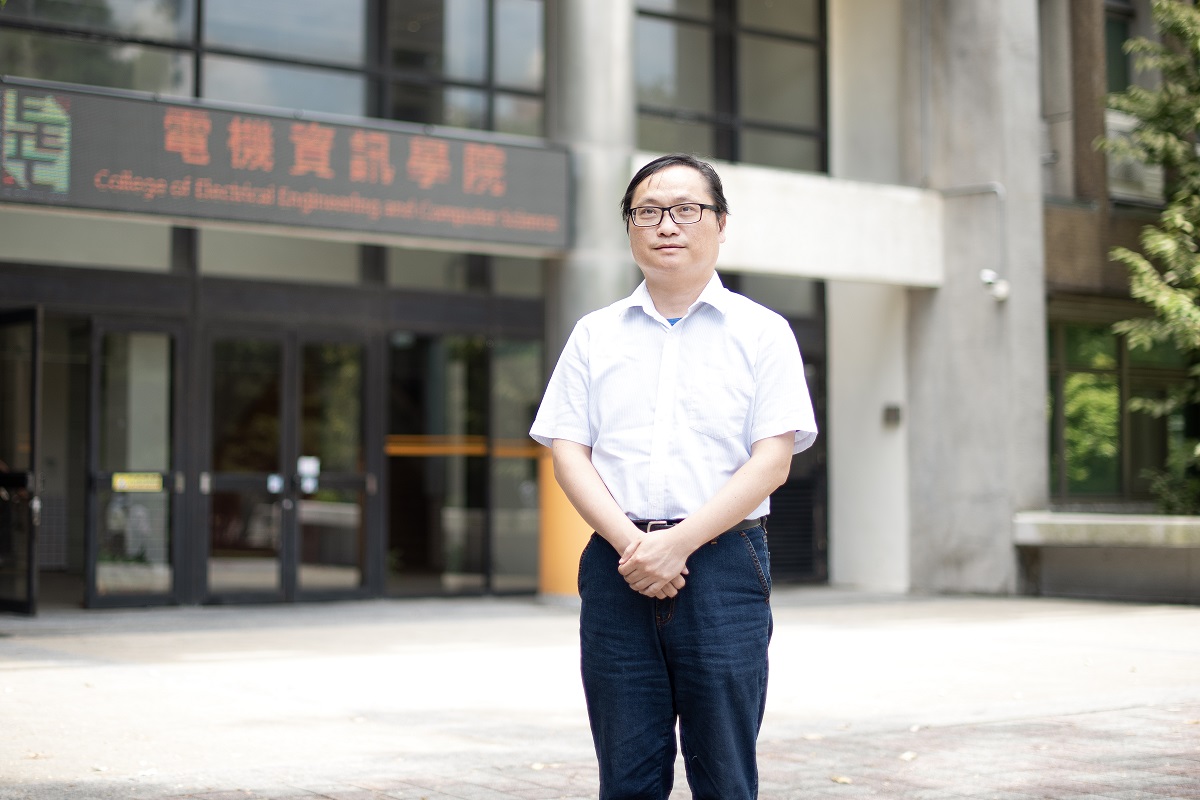吳宜鴻老師表示,在他近20年的導師生涯中,瞭解學生的想法是非常寶貴的經歷。這種理解可以通過不同方式實現,例如透過第一人稱觀察導生身上的特質,或者以第三者的角度,傾聽同學們關於彼此的點點滴滴。這些方法可以深入地瞭解學生的思維模式,成功理解學生並促進良好的師生關係。
Professor Wu indicated that in his close to 2 decades of life as a mentor, understanding the students’ thoughts is an extremely valuable experience. Such understanding can be accomplished through different approaches, for instance, observing the qualities of the trainees firsthand or listening to the classmates’ conversations with each other from a third-party point of view. These approaches can deeply learn about the students’ ways of thinking, thereby successfully understanding the students and establishing a good relationship with them.
「順其自然」的人生哲學
「平日不主動打擾,只在對方有需求時全力協助,這種相處方式已經在我們之間默契地形成。」吳宜鴻老師以輕鬆卻認真的語氣,描述著看似被動的互動方式,實際上卻讓學生保有一些空間。「只有不越線,他們才更願意前來尋求幫助,」他強調。因此,吳老師認為師長不必過度介入學生的生活,而是透過分享系上資訊的方式,雖然微小但已在無形中慢慢建立了關係。
對於需要交談的同學,吳老師有自己的原則,「我希望談話對學生有實質的幫助,所以會以較慎重的口吻,討論整體時程和預留時間,以期達到最大的幫助效果。」吳老師分享,這種方式不僅讓談話更順暢,也讓自己有更多的時間準備。
吳老師印象深刻的是,自己逐漸吸引來自班級之外的學生,「不知道從何時開始,陸續有修課學生前來詢問課業以外的問題,」他神態自若地講述著。雖然不太了解這些學生的背景,但吳老師秉持著「師者,所以傳道、受業、解惑也。」的精神,努力解答學生的疑惑。這種情況讓吳老師意識到,自己可以為更多的學生提供幫助。
The Life Philosophy of “Go with the Flow”
“The principle of getting along with each other by not actively disturbing others on ordinary days, but only offering full assistance when needed, has silently formed a mutual understanding between us.” Professor Wu described seriously with a light-hearted tone about what seemed to be passive interaction between him and the students actually allowed the students to have some space. He emphasized: “They are only willing to seek assistance when you do not cross the line.” Therefore, Professor Wu believes that the mentors do not need to become overly involved with the students’ lives, but rather subtly and slowly establish a relationship through the approach of sharing information regarding the department.
Professor Wu has his own principles for students who need to converse, “I hope conversations are substantially helpful to the students, therefore I would use a more cautious tone to discuss the overall schedule and allocated time, hoping to accomplish the optimized assistance.” Professor Wu shared that such an approach not only facilitates smooth conversations, but also gives him more time to prepare.
What impressed Professor Wu was that he gradually attracted students who were not in his class; he described calmly, “I had no idea when it started, but students taking the course also continue to come to ask about non-academic issues.” Although not knowing much about the backgrounds of these students, Professor Wu persisted in the spirit of “a teacher is someone who imparts knowledge, guides learning, and dispels doubts,” doing his best to provide solutions to these students. Such circumstances allowed Professor Wu to realize that he could provide assistance to more students.
看見積極且熱情的自己
「在鼓勵導生促成讀書會後,我們彼此一同深入研究各個領域,這個畫面令我難以忘懷。」吳宜鴻老師表示,當時讀書會的成員會樂於分享有關程式設計的各種主題,像是介紹自己感興趣的內容。「成立讀書會的用意,最主要並不在於提高成績,而是挖掘自己未來學習的潛力。」
此外,吳老師也支持學生完成程式檢定的平台。在學生架設完伺服器後,他也曾經幫助出題,對大一新生開放參加檢定。「這種感覺就像回到大學生活一樣。」吳老師提到,與同學們相處期間,他感受到學生時代的熱情。更令人驚奇的是,藉此認識了來自其他系所和校外的學生,最終甚至指導他們參加相關競賽。所有新奇的經歷,都成為難以忘懷的回憶。
Seeing Oneself with Enthusiasm and Passion
“After encouraging the trainees to set up a study group, we mutually delve into the various fields and this image is still unforgettable to me.” Professor Wu indicated that the members of the study group back then were willing to share the various themes related to program design, as if introducing the content of their interests. “The intention of setting up the study group was not in raising the grades, but rather to explore one’s potential for future learning.”
Moreover, Professor Wu also supported the students in completing the platform for program quizzes. After the students had completed the server, he also helped in setting the questions and opened it for freshmen to participate in the quizzes. “This feels like back in the university life.” Professor Wu mentioned that he felt the passion from his time as a student through the times spent with the students. What is even more amazing was that he became acquainted with students from other departments and outside of the university through this, and even guided them to participate in relevant contests in the end. All these new experiences became unforgettable memories.
灌溉助人的幼苗
在訪談的尾聲,吳宜鴻老師提到希望學生能多幫助他人,他說:「能夠幫助他人,代表著你具備一定的能力,只需要謹慎行事,避免產生不良的後果。」吳老師分享了一個學生的故事,這位學生經常展現出對班上其他同學的關心,而這些溫馨的畫面,讓吳老師更加關注每位學生的狀況。他語調堅定的說:「我覺得那位同學教會了我,要讓學生理解彼此互相關心的重要性。」
Nurturing the Seedling that Helps Others
At the end of the interview, Professor Wu mentioned that he hopes the students can be more assistant to others, he stated: “Being able to help others means you have a certain ability and all you need to do is be cautious to avoid adverse consequences.” Professor Wu shared the story of a student who often showed caring emotions to other classmates in the class and these heart-warming scenes made Professor Wu pay even more attention to the conditions of each student. He said firmly: “I think that student taught me that it is necessary to let the students know about the importance of caring for each other.”


